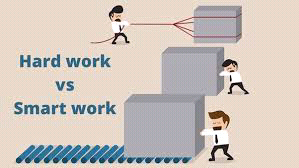
Hard work can be simply defined as putting in strenuous hours for doing a certain task or task. Smart work refers to finding effective and efficient ways to complete one or multiple tasks while also managing time and quality both.
“I’ll choose a lazy person to do a hard job because a lazy person will find an easy way to do it.” We aren’t sure exactly who said this, but we absolutely believe it. This quote challenges you to evaluate your workflows and whether your output justifies the amount of energy you put into it.
That’s not to say you should try to cut corners — quite the opposite. It’s about maximizing efficiency and producing the best work with less effort.
This is especially important in a fast-paced environment. Turning projects around quickly will put you ahead of the pack and help your organization stay on top of its mission.
But, efficiency isn’t always easy. While your habits might stop you because you’re used to doing it your way, sometimes it’ll be organizational processes or the bureaucratic red tape getting in the way of project approvals and deadlines.
Thankfully, working quickly is a skill like any other. Let’s look at the difference between hard work vs. smart work to supercharge your productivity.
Smart work vs. hard work: what’s the difference?
You’re probably already familiar with hard work. This is where you spend a lot of time and put in a lot of effort completing a task. Smart work, in contrast, is about churning out the same quantity of work with increased efficiency and reduced input, be that time, effort, or both.
Both smart and hard work require a strong work ethic and a commitment to quality. But smart work allows you to complete more daily tasks, so you can either go home early or move to a new task quicker.
Here’s a breakdown of the key differences between smart and hard work:

Time: Hard work means spending long hours on a task or series of tasks. Smart work involves completing the same amount of work (with the same quality) in less time.
Quality vs. quantity: Hard work often focuses on quantity rather than quality. Smart work treats them both equally.
Processes: Hard work is usually the default mode of working: getting things done without much thought about how. Smart work means you care about the work process as much as the task. This means prioritizing, delegating, and improving your time management to achieve the desired results.
Deadlines: Hard work isn’t always the best way to achieve a goal within a deadline. Smart work is about getting things done quickly, making it a better option for finishing things on schedule.
Let’s take a look at some examples.
Example #1
Task: You must coordinate a meeting between CEOs from six tech start-ups. The meeting needs to happen next week.
Hard method: You complete the task by yourself by creating an invite list, drafting emails and meeting agenda, inviting all required attendees, reserving a time slot that suits everyone, booking a convenient meeting venue, and organizing food while accommodating people’s dietary restrictions.
The whole job should take you about eight hours, but you also have other minor responsibilities to take care of. All in, it takes you about two days to lock everything down.
Smart method: Use a previous event invitation as a template (or find one online), change the date, and update the guest list and agenda. In your invitation, request that they advise you of any dietary restrictions by the end of the day. As you await their responses, you can book the venue and update the meeting invitation after confirming the location.
Example #2
Task: Coordinate a fundraising campaign for your organization’s new sports program for at-risk youth.
Hard method: You buy the ad space on TV, shoot the commercial, plan a letter-writing campaign, and organize an event celebrating the volunteers and donors. This task is a full-time job in itself, as it requires rigorous project management and content production.
Smart method: You hire a freelance videographer to shoot the TV ad, which requires time and technical skills. This will free you up to focus on the fundraising letters and event planning. It will also give you a healthier work-life balance for the campaign's duration, helping offset any potential risk of burnout or mental exhaustion.
Need help streamlining your workflow? Try working with BetterUp. Our coaches can help you manage your time, learn to delegate, and maximize your effort-to-productivity ratio.
How to develop smart work skills
Learning to work smart is, well, hard work. Here are some tips to work smarter, not harder.
Stop multitasking. You might think you’re multitasking, but you’re actually rapidly shifting your focus from one item to another, which just consumes valuable energy. It can take up to 15 minutes for your brain to reorient after switching, so you’re better off focusing on one.
Take breaks. When you have too much on your plate, you’re tempted to plow through the day without eating lunch, impacting your health in the long run. You risk wearing yourself out, which can lead to mistakes in your work.
And, if you never get sufficient rest, you risk burning out. Try using the Pomodoro technique to block your time and schedule regular breaks. You won’t do your best work at the end of a really long day, so save it for tomorrow when you’re fresh. It’ll probably take less time and be better quality with a fresh slate.
Do the hardest (and most pressing) tasks first. As you plan your week, ensure all time-sensitive tasks are at the top of your to-do list, enabling you to complete all your tasks within deadlines. For bigger projects, it’ll provide a buffer when something inevitably gets delayed.
Complete small tasks all at once. Bunching small tasks together will help you knock multiple items out in a short time. This includes answering emails, replying to WhatsApp messages, or making phone calls.
These tasks often require less mental focus, so you can tackle them between larger items. Then you can work through the afternoon without worrying about missing something important.
Follow your energy levels. Organizing your day around your energy levels will increase efficiency. If you’re most productive in the morning, schedule your most difficult tasks at that time. But if you still need a dose of caffeine at noon to reach your peak, use your morning to tackle less demanding work.
Automate what you can. Keyboard shortcuts, database scripts, and email filters are efficient ways to automate everyday tasks. If you put in some time to set things up, you’ll have ample energy to focus on other tasks.
Put yourself first. You’re unlikely to help anyone if you burn yourself out. Make sure you’re taking time for self-care in between working hard and avoid overworking.
Adopt a growth mindset. Every project is an opportunity to learn, grow, and hone your skills. With a growth mindset, you’ll constantly refine your methods to maximize efficiency.
A smart worker uses SMART goals
Before starting a big project, make sure you and your colleagues are clear on the “why” of the work. When everyone is on the same page and you have a clear work plan in place, you’ll waste less time debating the vision of the project midway through.
Use the SMART goal-setting method to make sure you have a clear vision. This means setting goals that are:
Specific: What exactly are you trying to accomplish? State your vision clearly.
Measurable: How will you know you've finished? You should have a clear way of measuring success. For example, if your goal is to streamline hiring new employees, indicate what speed you're aiming for.
Achievable: Is this goal realistic with your current available time and resources? If not, you may need to plan extra steps to achieve your goal.
Relevant: Does the goal correspond to your organization’s mission? Only work on long, arduous, expensive projects if they add value.
Time-bound: Do you have a clear deadline in mind? Setting an end date is vital to avoid meandering aimlessly for an indefinite time.
Hard work never goes out of style
Being efficient doesn’t mean being lazy. As a hard worker, you must ensure your input produces the maximum output. If you can master the art of efficiency, you’ll be ready to thrive in today’s fast-paced work environments.
With the above tips, you’re well on your way to balancing hard work vs. smart work. It’s all about time management skills, efficacy, and efficiency, keeping your mental and physical health in mind.
At BetterUp, our coaches can help you learn to streamline your workflow, communicate efficiently with your team, and develop the skills necessary to thrive in a modern workplace

Nice
Downvoting a post can decrease pending rewards and make it less visible. Common reasons:
Submit
We recommend that you first introduce yourself to the Newcomers Community through Achievement 1.
We are currently unable to verify your account.
Thank you for the good cooperation.
Downvoting a post can decrease pending rewards and make it less visible. Common reasons:
Submit
You really did a good job explaining the difference between hardwork and smart work, the examples you gave are correct
Downvoting a post can decrease pending rewards and make it less visible. Common reasons:
Submit
Absolutely! Hard work has always been valued and appreciated, and it continues to be relevant and essential in today's fast-paced work environments.
Downvoting a post can decrease pending rewards and make it less visible. Common reasons:
Submit